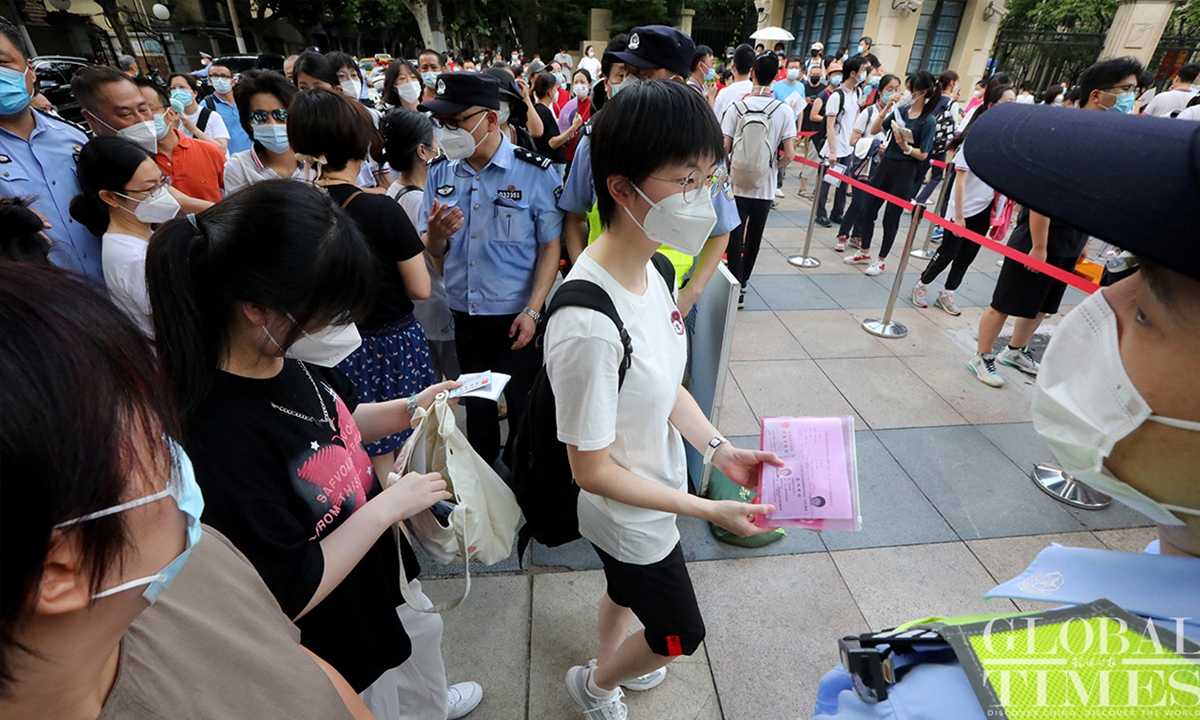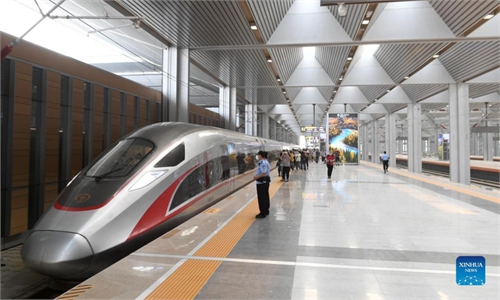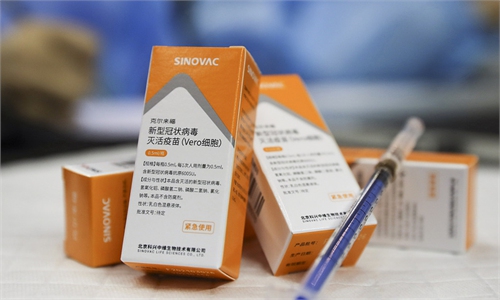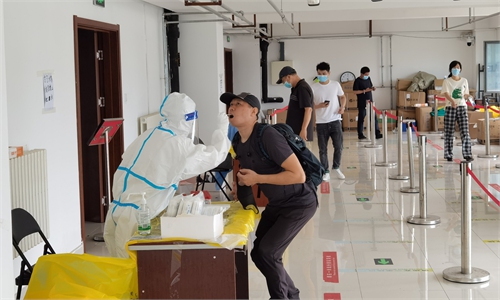
On early Thursday morning, students lined up to walk into the Shanghai Shixi High School, one of the designated college entrance exam sites following preventive epidemic measures.Photo: Chen Xia/GT
More than half of all districts in Shanghai will start a three-day mass nucleic acid testing on Tuesday as the city is in a tug-of-war against a new wave of COVID-19, which has seen 319 positive cases, with the city designating one high-risk and 37 medium-risk areas.Facing the new challenge of the highly transmissible Omicron subvariant BA.5.2.1, many locals fear a return to the situation in March, when the city went into a two-month static management to curb the spread of the virus. However, experts believe the situation will be better this time, given the rich experience the city has accumulated from the previous battles and fresh lessons it can draw from Beijing and Xi'an.
Shanghai health authorities announced on Monday that the city reported six confirmed cases and 63 asymptomatic cases on Sunday, all but one detected in already controlled areas.
So far, a total of 319 positive cases, including 85 confirmed cases and 234 asymptomatic cases have been reported in the city since July 3, mainly linked to the cluster infection from a karaoke bar in Putuo district. Comprehensive analysis of epidemiological investigation and virus gene sequencing comparison results showed that the cluster infection in a beverage company in Huangpu district and the outbreak in a community in Songjiang district shared the same transmission chain with the Karaoke bar outbreak.
What made the situation in Shanghai more complex is the discovery of a COVID-19 case involving the new Omicron subvariant BA.5.2.1. Zhao Dandan, deputy director of Shanghai's Health Commission, said at a press conference on Sunday that the case, found in the financial district of Pudong on July 8, was linked with a case from overseas.
Shanghai's civil affairs authority stressed at Monday's press conference that the city has always attached importance to the work of preventing imported COVID-19 cases and will strictly implement closed-loop transportation and quarantine measures for inbound personnel at Shanghai ports.
At present, in accordance with the ninth edition of China's national prevention and control plan, the city has implemented "7+3" quarantine control measures for inbound travelers. It means international arrivals must undergo seven days of centralized isolation for medical observation and another three days of home health monitoring.
The Sports Bureau of Xuhui District announced on Monday that to effectively curb the spread of the epidemic, indoor sports venues, including swimming pools, in the district will be suspended from opening to the public from Monday.
The arrival of the highly transmissible subvariant aroused many residents' memories who have just emerged from a grueling two-month home-staying. Many netizens asked whether the city would implement another large-scale lockdown on the city government's anti-rumor platform.
Local authorities responded on Sunday night, saying that from Tuesday to Thursday, nine districts and other districts with a record of positive cases will undergo mass nucleic acid testing and during the period, people can move freely with a negative certificate from within 48 hours.
A local resident surnamed Feng told the Global Times that compared with the situation three months ago, the anti-epidemic measures the city is taking in dealing with the latest spike is more accurate and effective. "For example, confirmed cases and their close contacts have been sent to quarantine places in the first place."
However, cases of discrimination against recovered patients also attracted public attention as media reports said a worker who had tested positive while working in a makeshift hospital in Shanghai but has since been discharged was denied entry by many enterprises.
At Monday's press conference, Shanghai officials stressed that no companies or individuals may discriminate against patients, pathogen carriers or suspected patients of infectious diseases.
"All departments and units in Shanghai should treat COVID-19 patients without discrimination in accordance with relevant laws and regulations. People from all walks of life should show more care to them, should not label them, set no barriers in their work and life, and not let them live under the shadow they should not have," the official said.
With higher transmission risk and no obvious change in death rate compared with previous Omicron subvariants, the BA.5 subvariant is no doubt quite a challenge to Shanghai's anti-epidemic system and this requires a quicker response to locate the infection source, carry out epidemiologic investigations, and implement control measures in precise places, a Beijing-based respiratory expert told the Global Times on condition of anonymity on Monday.
With the experience of Beijing and Xi'an in tackling BA.5 and the lessons Shanghai learned from its previous lockdown, Shanghai can deal with the new subvariant, the expert said.




